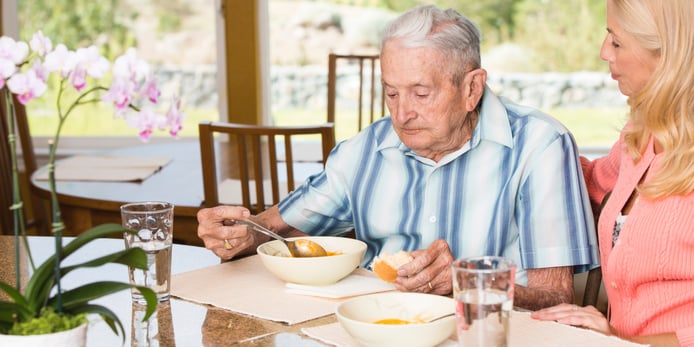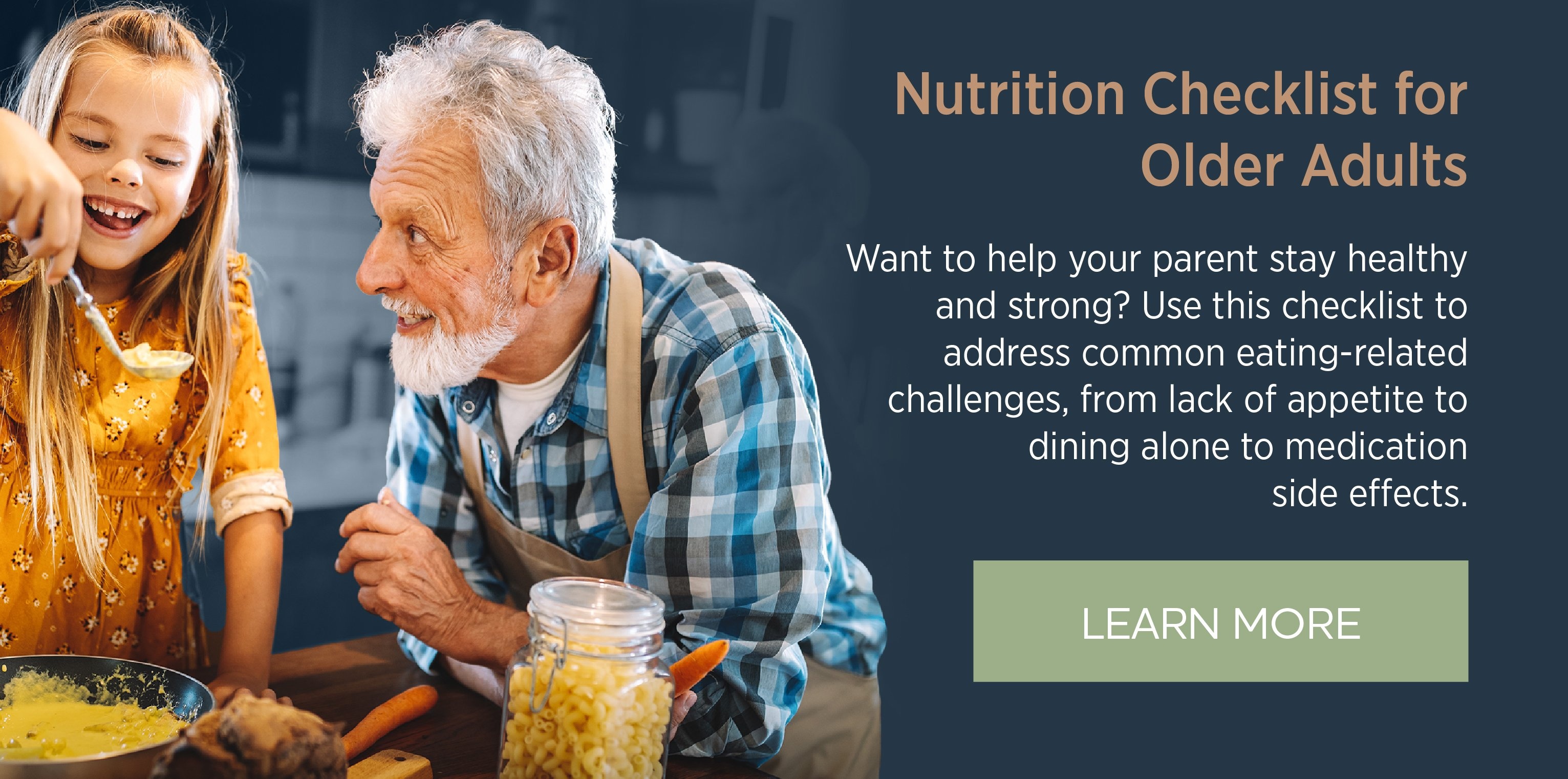 It’s not always easy to spot a poor diet in an aging adult. Although there might be a sudden weight loss or gain, the warning signs of poor nutritional health are often overlooked.
It’s not always easy to spot a poor diet in an aging adult. Although there might be a sudden weight loss or gain, the warning signs of poor nutritional health are often overlooked.
That’s because poor nutrition in seniors isn’t just caused by eating too little food or food that is lacking in nutrients. It’s often a combination of factors that make it more difficult over time for older adults to get the food they need to stay healthy in mind, body, and spirit.
“A well-balanced diet can be hard to achieve as adults age,” says LaTresh Walker, Health Care Director at Highgate at Temecula. “This could be due to a number of things, such as failing eyesight due to macular degeneration, difficulty using appliances, not being able to drive any more to be able to go shopping, medication changes, poor dental health, difficulty chewing and swallowing, memory loss, and much more."
Just like the causes of poor nutrition are multifaceted, the effects of poor nutrition on seniors are far-reaching:
- Higher risk of heart disease, stroke, Type 2 diabetes, and some cancers
- Weakened immune system, which increases the risk of infections
- Decreased bone mass and muscle weakness, which can lead to falls and fracture
Worried your loved one is at nutritional risk? Here’s a closer look at the common warning signs of poor diets in older adults and what can be done to overcome these barriers to healthy eating.
1. Loss of Appetite
If your mom keeps telling you she’s “just not hungry,” there could be a few reasons why: She might be feeling sad or depressed, not getting enough physical activity, or struggling with medication side effects.
If she’s eating less than two meals per day, and those meals include few fruits or vegetables or milk products, then it’s likely she’s not getting the nutrients she needs.
How to help:
“Find food that they like and offer it to them,” Walker says. “If they aren’t a big eater, give them smaller portions at mealtimes or offer snacks throughout the day. Keeping them active and busy throughout the day will help them build up an appetite, too.”
2. Not Always Physically Able to Shop, Cook, or Eat
If your loved one has mobility issues, they might not be able to easily get to the grocery store for fresh produce or cook their own nutritious meals. Health conditions like arthritis and Parkinson’s disease can make it harder for them to cook. Strength and coordination issues can make it challenging to actually eat.
“A husband and wife recently came to us in an emergency situation,” Walker recalls. “They were not getting the proper nutrition they need at home due to a decline in health and the inability to drive anymore.”
Now that many seniors feel vulnerable leaving their home, it’s challenging for everyone to have the right ingredients at home to have a well-balanced diet.
How to help:
Consider finding a meal delivery provider near you on the Meals on Wheels America website.
3. Eats Alone Most of the Time
If your loved one eats alone, they might not enjoy meals as before and lose interest in cooking and eating.
“A well-balanced diet requires planning, preparation, and cooking to make it happen,” says Steve Lin, Health Care Director at Highgate at Vancouver. “As adults age, there can be less energy and desire to put in the work necessary to achieve that result. Also as people age, most live with their spouse or alone. Cooking for a family is easier because there is motivation to feed your family well. When it is just you, people sometimes resort to something easier while sacrificing nutrition.”
Studies have shown that eating alone is associated with a host of unhealthy traits, including loneliness, social isolation, unhealthy food choices, and inadequate fruit and vegetable consumption.
How to help:
Try to share meals with your loved one as often as you can. When you can't be there, consider suggesting they vary where they eat. For example, if the table seems empty when no one is there, encourage them to eat on the porch when the weather is nice.
4. Tooth or Mouth Problems That Make It Hard to Eat
Has your loved one been complaining about tooth pain, gum pain, or ill-fitting dentures? If they’re struggling with tooth or mouth problems, they might also have a difficult time chewing. Sores and irritation can also make eating difficult or painful.
How to help:
Arrange a dental appointment to ensure the health of their gums and teeth and, if applicable, that their dentures fit.
5. Illnesses, Conditions, or More Than 3 Medications
If your loved one has an illness or condition, it might change the kind or amount of food they eat.
For instance, disease-related inflammation can not only lower a person’s appetite but also change how the body processes nutrients. Someone who is on a restricted diet to manage medical conditions, such as limits on salt, fat, or sugar, might actually have a harder time making good food choices. And some medications can affect appetite or the ability to absorb nutrients, too.
Plus, there are just normal age-related changes in taste and smell that can make it difficult to enjoy eating.
How to help:
Ask your loved one’s doctor or pharmacist if any of their prescriptions or health conditions could be causing a direct reduction in appetite.
For over 20 more tips to help your loved one to eat healthily and cope with changes that affect their appetite and eating, download our Nutrition Checklist for Older Adults.






